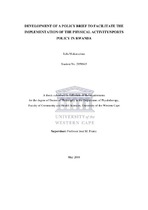| dc.description.abstract | The importance of health enhancing physical activity participation (HEPA) has always been
emphasized globally, as one of the means to reduce the risk of Non-Communicable Diseases
(NCDs) occurrence. In Africa, it is more relevant currently, due to the growing burden of
NCDs that is coupled with the existing encumbrance of communicable diseases. In Rwanda,
specifically, there are limited national strategies to promote health-enhancing physical
activity. Consequently, the level of physical activity among Rwandans, especially
government office workers, is likely to diminish, which could possibly be attributed to the
rapid urbanization that comes with lifestyle changes. Basically, most people tend to abandon
the traditional labour-intensive activities, which are associated with high energy expenditure,
to more sedentary activities. Therefore, the need to promote health enhancing physical
activity participation is crucial.
Physical activity participation is an intricate and multifaceted behaviour that may not be
viewed from a linear perspective. This current study adopted a socio-ecological framework to
assess the factors that influence Leisure Time Physical Activity (LTPA) among government
employees in Kigali City. The study used an exploratory, sequential, mixed methods of
qualitative and quantitative designs, in order to comprehensively explore and understand the
research problem. Qualitatively, a Case study and exploratory design was used to collect data,
specifically from the Rwanda Sport Policy and its implementing stakeholders. Quantitatively,
a cross-sectional, descriptive design was used to assess and describe the levels of LTPA
among government workers in Kigali City, as well as highlight the various factors that
influence, or limit, their participation. | en_US |

